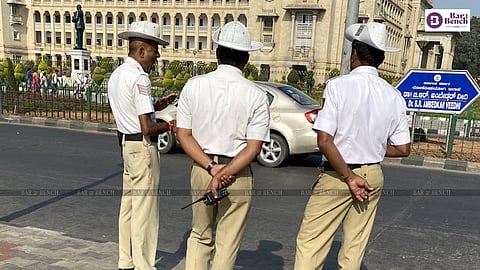
- Latest Legal News
- News
- Dealstreet
- Viewpoint
- Columns
- Interviews
- Law School
- Legal Jobs
- हिंदी
- ಕನ್ನಡ

Traffic challans in India serve as official penalties for violations of traffic regulations. While they play a crucial role in maintaining road discipline and safety, there are instances where motorists receive fines unfairly or erroneously.
Understanding your rights and the proper channels for disputing a challan is essential to ensuring justice and avoiding unnecessary financial burdens.
A traffic challan is issued under the provisions of the Motor Vehicles Act, 1988, and its subsequent amendments. The penalty for an infraction varies based on the nature of the violation, ranging from monetary fines to license suspension or, in severe cases, imprisonment. The advent of digital enforcement mechanisms, including AI-based surveillance and automated traffic cameras, has significantly increased the issuance of challans. While these technologies enhance efficiency, they have also led to instances where penalties are issued without proper verification, making it imperative for motorists to be aware of their legal rights.
When issued a traffic challan, you are entitled to certain rights. The first is the right to receive complete information about the violation, including the nature of the offence, the location and supporting evidence such as photographic or video proof. If you believe the challan was issued incorrectly, you have the right to contest it through the appropriate legal channels. Additionally, you are entitled to a fair hearing in court, where you can present your case, and you may seek legal representation to strengthen your defense.
Governments across India have introduced measures to make traffic challan payments more accessible and provide relief to motorists burdened with high penalties. In December 2024, the Delhi Traffic Police organised Lok Adalats (people’s courts) in collaboration with the judiciary, allowing motorists to settle pending challans at significantly reduced amounts. A Delhi resident, for instance, was able to clear challans worth ₹50,000 for just ₹500 through this initiative.
Additionally, in September 2024, the Delhi government implemented a policy offering a 50% reduction in fines if paid within a specified time frame. This move was aimed at encouraging timely payments and reducing the backlog of pending cases. These initiatives reflect a growing acknowledgment of the need for a fair and efficient challan resolution system.
If you wish to challenge a traffic challan, the first step is to carefully review the details provided. Ensure that the violation cited aligns with your actions at the time and location specified. Next, gather any relevant evidence to support your case, such as GPS data, witness statements, or dashcam footage.
The dispute process generally involves filing an appeal with the traffic police department through their online portal or in person. If the issue remains unresolved, you can escalate the matter to the relevant court. Attending hearings is crucial, as it allows you to present your case directly before a judge. While legal representation is not mandatory, it can be beneficial in complex cases. If the court rules in your favour, the challan will be dismissed, otherwise, you may be required to pay the fine or face additional penalties.
To ease the burden on conventional courts, alternative mechanisms such as Lok Adalats and evening courts have been introduced. Lok Adalats facilitate amicable settlements between motorists and traffic authorities, often resulting in reduced fines. Evening courts, operating beyond standard hours, cater to individuals unable to attend hearings during the day. These initiatives have played a pivotal role in expediting the resolution of traffic cases and reducing pendency in judicial forums.
While disputing an unjust challan is an option, preventing infractions in the first place is the best approach. Adhering to traffic laws, maintaining valid vehicle documents, and staying updated on regulatory changes can help avoid unnecessary fines. Additionally, using apps that provide real-time traffic updates and enforcement locations can assist in ensuring compliance with road rules.
Traffic challans are a critical tool for enforcing road safety, but their issuance must be fair and transparent. Understanding your rights and the mechanisms available to dispute erroneous penalties empowers you as a motorist. With increasing digital surveillance and stricter enforcement, staying informed about recent legal developments and dispute mechanisms is essential. As India continues to modernise its traffic management systems, a balanced approach that ensures compliance while protecting motorists’ rights will be crucial for an equitable enforcement landscape.
Arvind Singhatiya is the Founder & CEO of LegalKart.